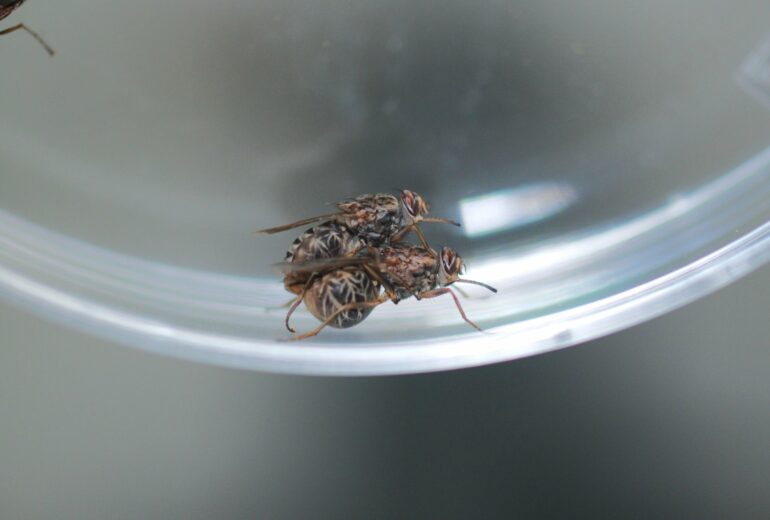The fertility of both female and male tsetse flies is affected by a single burst of hot weather, researchers at the University of Bristol and Stellenbosch University in South Africa have found.
The effects of a single heat wave were even felt in the offspring of heat-exposed parents, with more daughters being born than sons.
The study, published today in Proceedings of the Royal Society B, helps explain why tsetse are declining in some parts of their range in Africa. This has important implications for the disease they spread, particularly sleeping sickness in humans and nagana in cattle.
Lead author Dr. Hester Weaving from Bristol’s School of Biological Sciences said, “A single heat wave damaged both male and female fertility of disease-spreading tsetse flies, sending populations into decline.
“Ultimately, heat waves can drive insect biodiversity loss through both direct death and fertility losses, which is concerning given that heat waves are increasing in frequency and intensity due to ongoing climate change.”
Scientists know that in a lot of animals, fertility is damaged at less extreme temperatures than those that kill them. In some cases, animals can become entirely sterile in response to heat, making them incapable of producing offspring. Generally, male fertility tends to be more temperature sensitive than female fertility, so the current results are surprising.
The team performed experiments in the lab using water baths at Bristol to mimic a heat wave event. To determine if females or males were more sensitive to a heat wave, they heat-exposed them separately and then paired them with unexposed members of the opposite sex. They measured how many offspring the flies produced and how many deaths occurred over six weeks after the heat wave.
Dr. Weaving said, “We looked at this in tsetse flies that spread the disease sleeping sickness in sub-Saharan Africa to humans, livestock and wild animals.
“They are fascinating insects as they develop a single egg at a time, feeding it as a larva in utero with a milk-like substance. The mother will then give birth to the larva which can be the same weight as themselves.”
The researchers have shown that male fertility being more heat sensitive is not common to all insects.
Senior author on the study, Dr. Sinead English, said, “Our study provides important insights to how climate change will affect disease-carrying insects. We can’t assume that patterns in tsetse match those found in better-studied lab systems like seed beetles or fruit flies.”
Now further insect species should be measured to see if this result is widespread among other insect species with important implications on their global distributions in the face of climate change.
More information:
Hester Weaving et al, Heatwaves are detrimental to fertility in the viviparous tsetse fly, Proceedings of the Royal Society B: Biological Sciences (2024). DOI: 10.1098/rspb.2023.2710. royalsocietypublishing.org/doi … .1098/rspb.2023.2710
Provided by
University of Bristol
Citation:
Tsetse fly fertility damaged after just one heat wave, study finds (2024, March 12)



